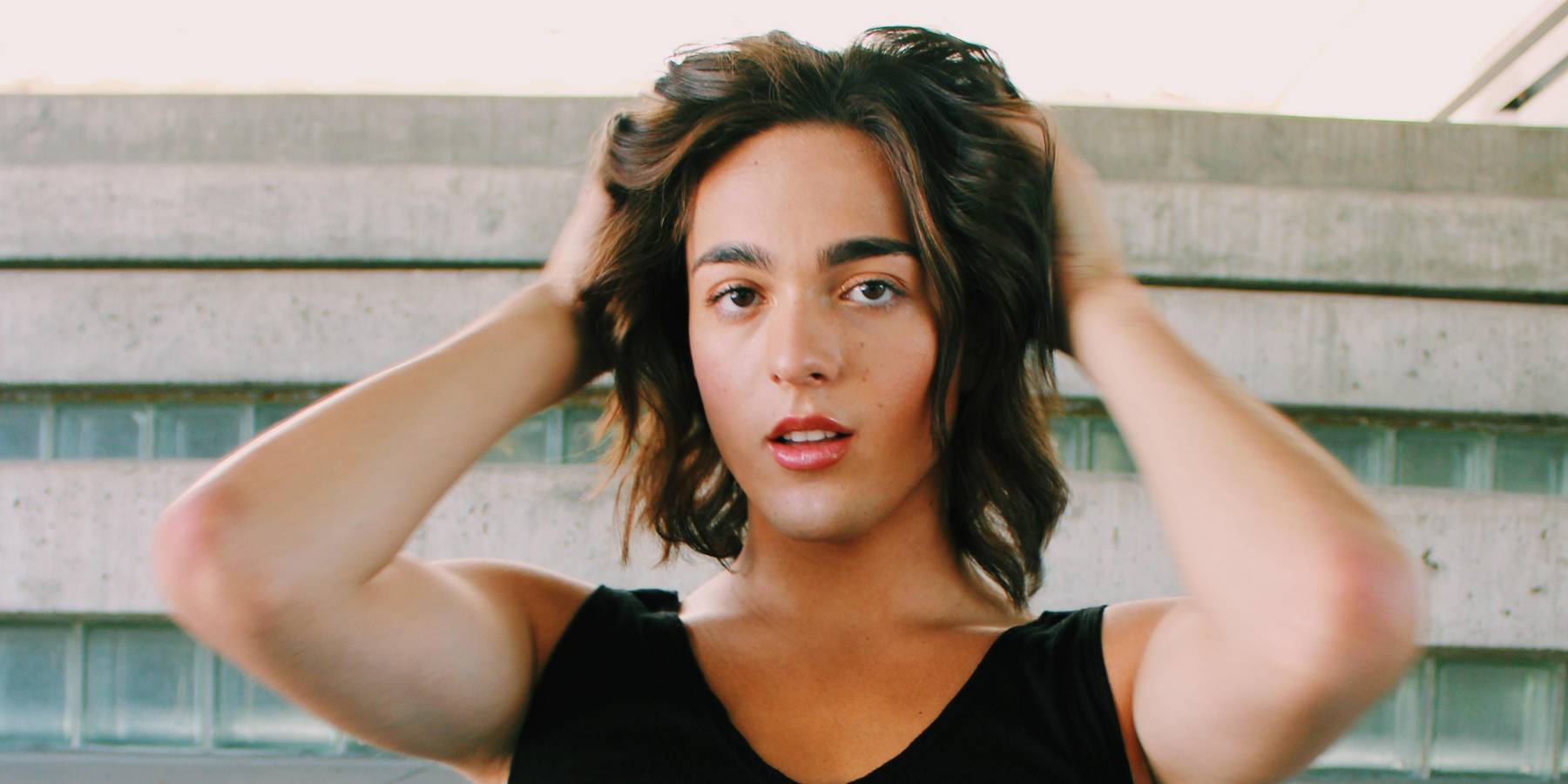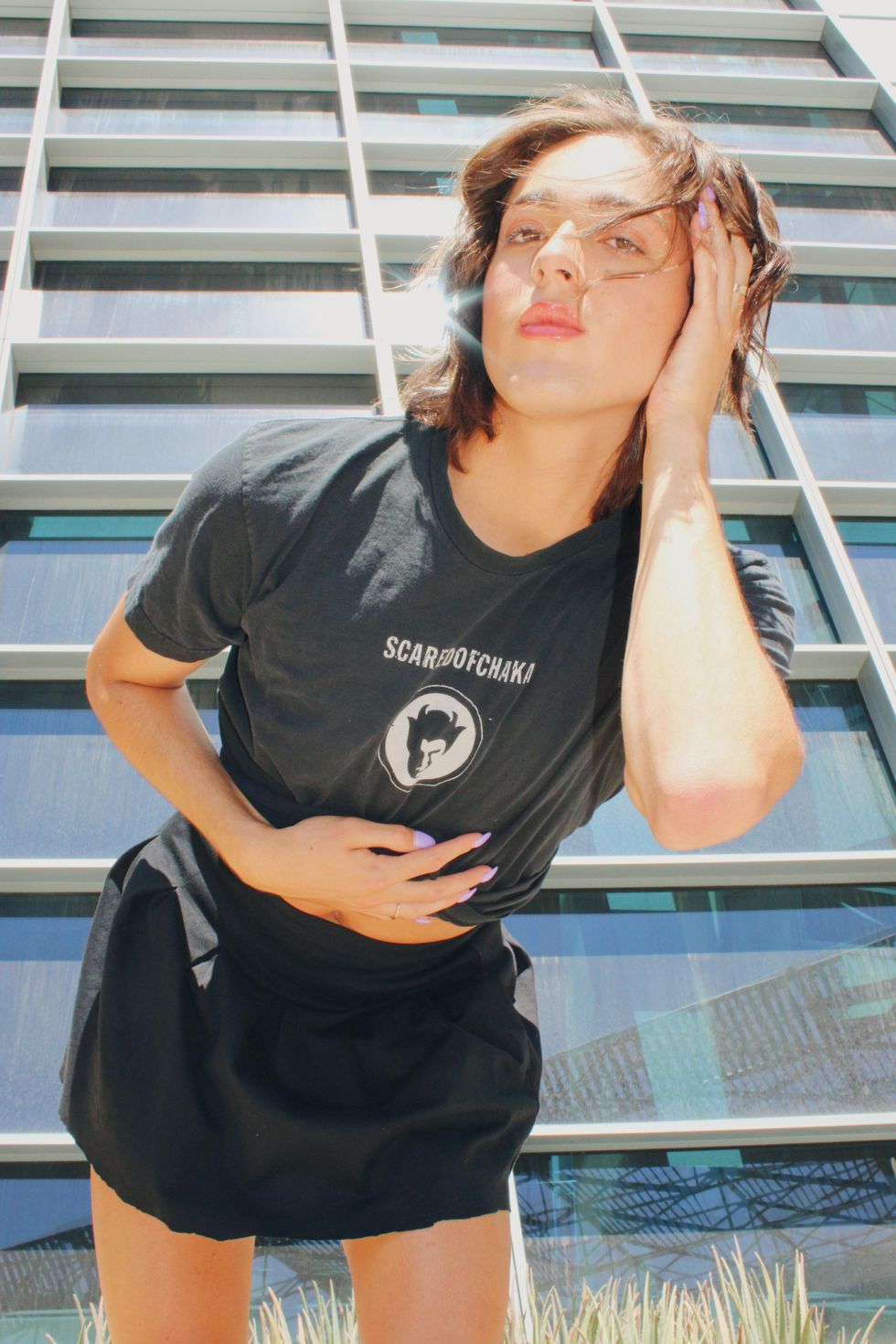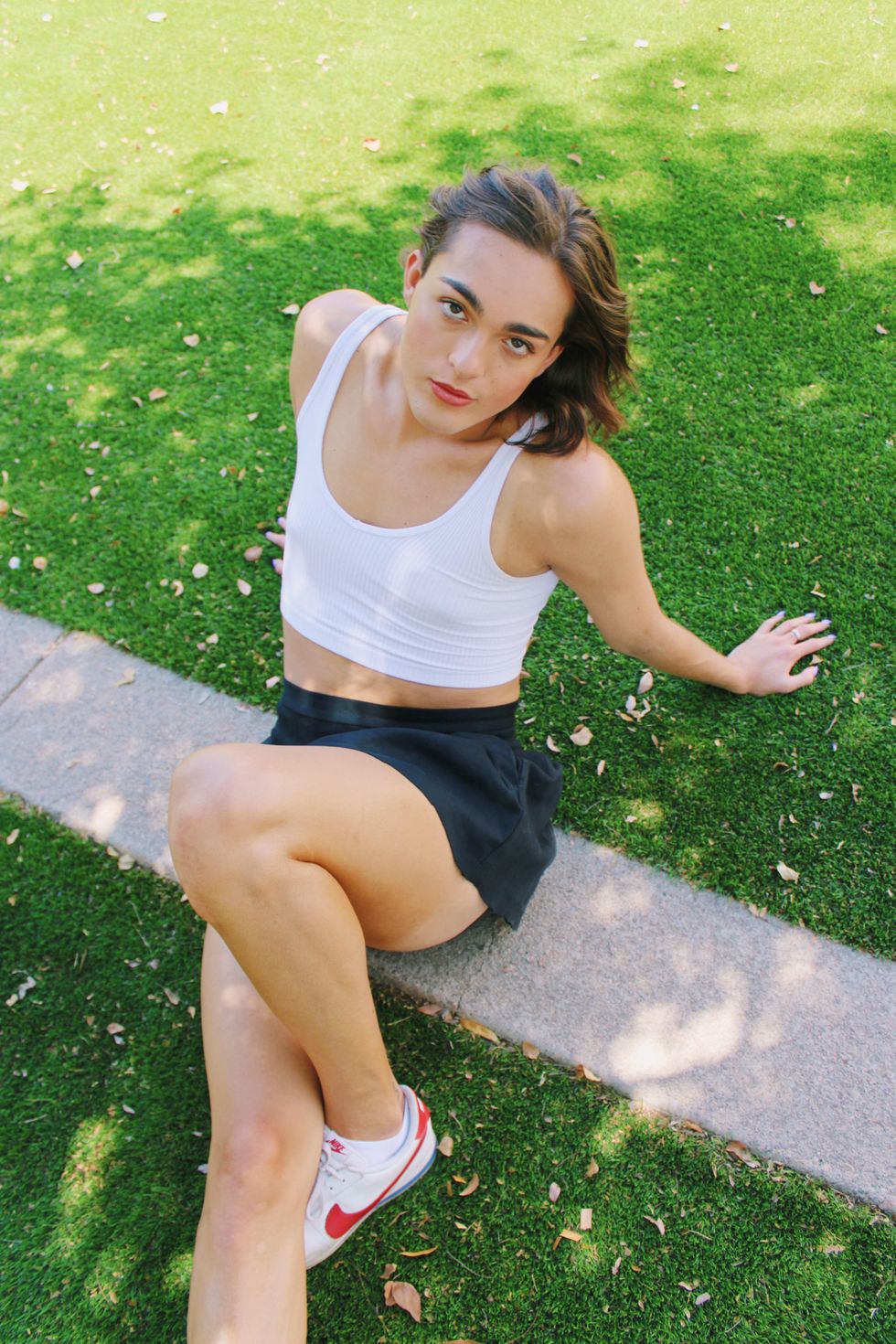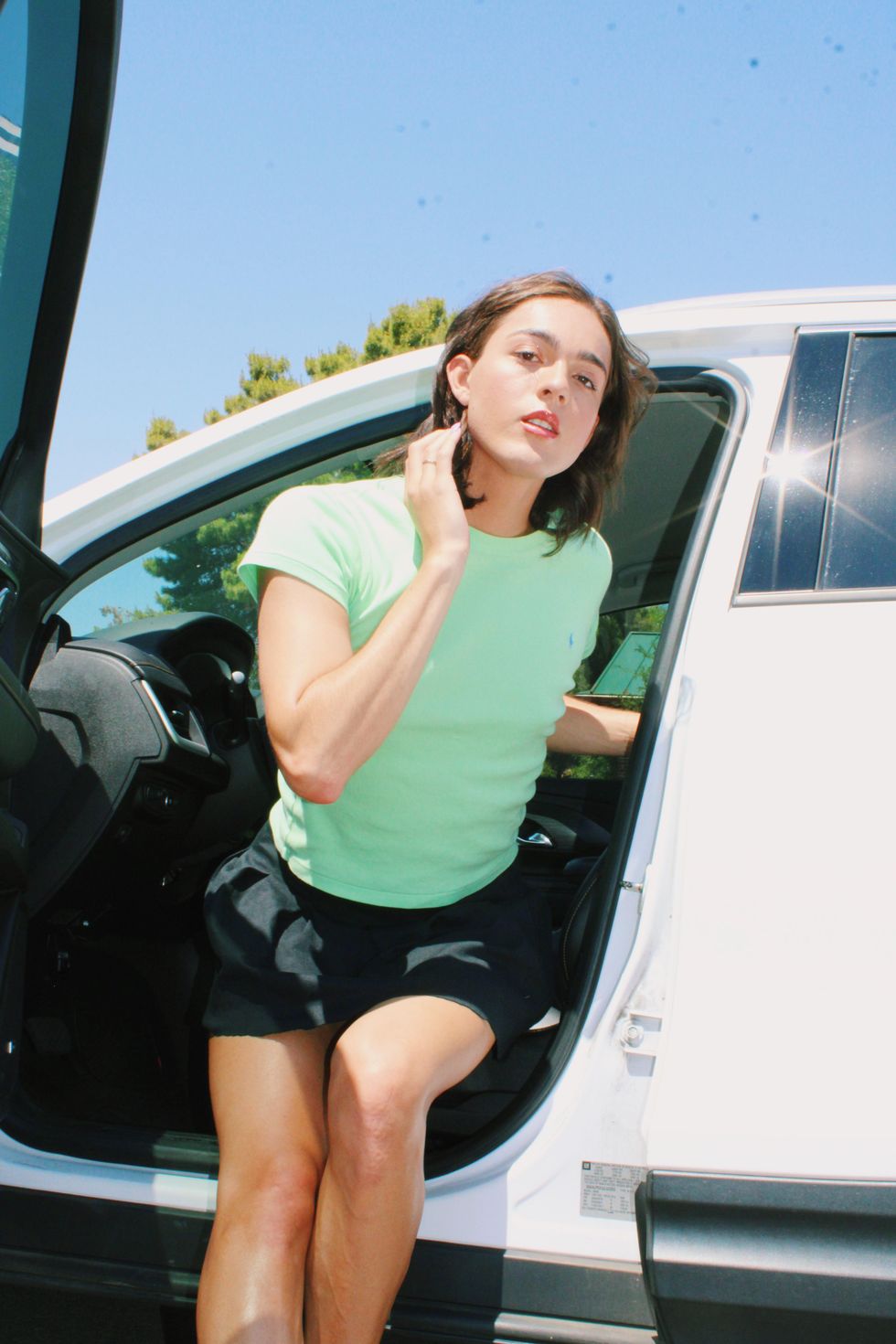
The day before Pride Month kicked off this year, Dance Moms alum Zackery Torres revealed that she was in the process of transitioning. Her excited announcement, which also revealed her new "they/she" pronouns, came with the reveal that she'll soon be posting more on TikTok.
"I honestly didn't think that a lot of people would care and I think that's what's so funny about the whole thing is I posted that Tik Tok because I was excited," she tells PAPER. "I was really feeling amped to be back on social media." As she begins this new chapter, Torres isn't just ready to return to dance, but also evolve a much-needed conversation about gender inclusivity within the dance world.
The Phoenix-born 22-year-old came to national attention as a mesmerizing young talent on the first season of Abby's Ultimate Dance Competition. Though she finished in ninth place, she got scouted by producers for Dance Moms and became a regular on that show. She continued on in the world of dance afterward, eventually enrolling at the University of Southern California's Glorya Kaufman School of Dance. During her sophomore year, she came out as nonbinary.
While there, Torres started to open up about the expectations that instructors had for dancers based on gender. Speaking to USC's student newspaper The Daily Trojan, Torres detailed her experience as a male dancer. "I started seeing all of the expectations that teachers — well-known dance teachers, and well-known choreographers — had for me as a male dancer growing up and at the time identifying as a boy," she said. "'Oh, you're too feminine, you need to dance like a man.' Just having teachers tell you that on national television, all this stuff, it kind of really got to me."
Instead of letting it continue without protest, Torres has made great strides towards more inclusivity in dance. Last year, she published An Evolving Conversation on Gender: Dance Edition, an instructional guidebook that acts as a starting point for the dance community to learn about gender inclusivity. She's also the CEO and founder of Continuum Community, a company that gives important community resources for gender inclusion.
Here's Torres on her transition, advice to others and her gender inclusive work in dance.

Over the years, how have you become more comfortable with who you are?
I think in general, as you grow and develop and find your place in the world, you can understand where you fit and the types of people that you want to be around. People are the absolute, most important part of loving yourself because if you're not in an environment where you can thrive and grow and do so unapologetically, there's no way that you can feel comfortable and be excited about who you're turning into.
I've become comfortable with who I am just by continuing to surround myself with people that inspire me, encourage me and challenge me to keep growing. And I think that's the most impactful part of the last couple of years — that I've accepted the fact that I don't know everything, and that I'm going to grow and develop into whoever I'm going to grow and develop into, and to take that pressure away and just trust that I'm surrounded by the people that love and care about me the most. If people are not on that bandwagon, they don't belong in your life and will stunt your growth. I have to be in an environment that allows me to grow and be comfortable.
When did you decide to transition?
So far as being transgender, that's something you know the first time you're conscious, like when you're super little, and I've always known that my body, my brain and my soul were not in harmony. And because of that, I definitely knew that it was time for me to start to consider what it would mean to be in harmony with my body. Logistically, I understood what that meant for me when I was 21 years old. And it's a scary thing to realize because transitioning is not easy. There's a lot of different aspects to it, lots of doctor's appointments, lots of things to discuss and figure out. It's a logistical nightmare. So I think it's always funny when people think that people are transitioning for clout. I've heard a lot of that the last couple of weeks, and I promise you, it's not an easy feat to take on. But what motivated me was just really wanting to be in harmony with my mind and body. And as a dancer, I think I've had such an interesting relationship with my body and I've known and understood it at a level that a lot of people don't.
But also because I have been training so consistently for the last decade, or even more than that now, I never had the opportunity to really take a break and understand what that would mean for me as a dancer to transition. So that's also something that was interesting. Having 2020 and 2021 to really take a step out of the studio just due to the pandemic and COVID-19, I was really able to think about who I wanted to be and where I was headed, and that's kind of what motivated me to finally start the journey.
What was going through your mind when you made the announcement?
I honestly didn't think that a lot of people would care and I think that's what's so funny about the whole thing is I posted that Tik Tok because I was excited. I was really feeling amped to be back on social media. I took a little bit of a break and was kind of doing my own self discovery, figuring out what my next steps were as a new, recent college graduate with my Bachelor's Degree in Fine Arts.
I was like, oh, I'll just come back to Tik Tok, make some fun videos. I really didn't think anything of it. I literally told my best friends who were there with me when I filmed that Tik Tok, I was like, this one's probably not going to do that well. I just need to do it for myself because I'm kind of a very type A personality. I like to make it all make sense.
How has your life changed since deciding to transition?
I've had to be really picky about the people I surrounded myself with. And therefore, there are definitely less people in my close circle now. Transitioning is a very emotional and a very draining process. And so if you're not surrounded by people that lift you up, then you're screwed. So that I think has been the biggest change for me is just my circle has gotten smaller and I've really had to lean on the people that are still in my circle. And it's been really beautiful because I feel like I've gotten really close with some really amazing people and support systems, and I'm so grateful for that.
The best part of this process is just the little things. I saw a clip of Elliot Page's interview with Oprah recently. Oprah asks, what's been the best part of transitioning? And in my head, the first thing I thought of was getting out of the shower and wrapping the towel around right below my shoulders rather than my waist. And he said the same exact thing, but the opposite, and I screamed. And I was like, oh my gosh, that is so true. It's all the little things. My hair growing out and finally feeling it on my back.

What advice do you have for other people on the same journey?
I mean, that is a really hard question because I think every person is their own person. There's no other way to say it. So they'll know when it's time for them, but I think a lot of the thing that I think I want to bring up is the idea of privilege and the financial part of transitioning. It is so expensive to do so, the doctor's appointments, medication, the surgeries, the recovery, caretakers, hospital stays. There's so much, and I haven't even gone there. I'm just kind of now at the beginning of my transition. And so there's a lot to come.
And so I don't know if I have anything crazy inspirational to say other than, I think it's good that when we have and see trans people in the news, a big thing that needs to come up is the fact that those people that are in the news like me and like a good friend of mine, Josie Totara, and all these amazing people that are transitioning or are transgender and they're public about it, we have a lot of privilege. We're in the news. People support us and we have a lot of, I mean, there's a lot of negative thought too because we're kind of in the line of fire, but we have privilege and I think that needs to be brought up because not everyone who comes out gets news coverage and all this overwhelming support and doesn't get the opportunity to share their voices. And it is such a hard thing to do and transitioning is hard. It's expensive, it's emotionally challenging. And so I think my advice is do it when you're ready and really lean on the people that you love and keep that circle, keep the people in your circle close to you because you're going to need them.
What's next for you in the world of dance?
Oh boy, that's a big question. I hope what's next for me is continuing to advocate in the world of dance and continuing to use my personal research and experiences to help push forward the entertainment industry to be more inclusive. I also want to continue shaping communities at a local level, to then expand to a bigger national worldwide level of inclusivity and equity.
I just finished my BFA in dance. I'm at the top of my game right now, and I hope to keep dancing as I continue working and doing things. I can't wait to be back in the studio and keep training and doing my thing. And as far as what that looks like logistically, I'm not quite sure yet, but hoping that all figures itself out and that I can really be a light for a lot of kids out there to see that it's possible to be a transgender person and dance before, during and after your transition.

How do you think your efforts in gender inclusion in dance have impacted the realm so far? Have you noticed any change?
I have noticed so much change in the dance industry since I released my book and started my company. It has been honestly on smaller local levels, and I think that's what's the most amazing thing is one person reads the book or one person asks me a question and then they go back to their communities and start spreading those things. I've done podcasts, interviews, just the little things. And my whole goal is to make it all very easily understood.
I am a very practical and logical thinker. And in school, I did a lot of classes in advocacy, legal communication and just problem solving. And I really did a lot of that. And I'm also doing a lot of that in my Public Relations and Advertising Master's Degree. So it's definitely something that I'm passionate about.
So when I think about Continuum and when I think about the book, I want it to be an invitation and a guide to help people get started. It's definitely not the end result. We want to keep growing. We want to keep going. I have so much more I would have added to it. You learn every single day and I just want people to feel excited to learn it. I don't want it to be some daunting, scary thing, because I think people don't want to dive in head first because they're scared of messing up or different things. And I always just really want to make sure that Continuum Community is a resource hub for people of different backgrounds as much as possible and just make it super easily understood.
What was the inspiration for creating Continuum?
Honestly, my inspiration for creating Continuum was I found myself in a system that wasn't built to include me, so I wanted to build a new one. And I say that quote often and I really mean it. Like I said before, I'm a practical thinker. And so when I was in school and in this system and then I identified as nonbinary and I was like, this isn't working for me. I don't know where to go here. I don't know what steps to learn, what bathrooms to use. There were a lot of things.
And so instead of retreating and being upset about it, which is definitely a valid response, I saw these systems and thought about how I could make one that includes everyone. And I just started taking notes, recording, transcribing rehearsals. My professors and classmates at USC told me it was helpful and that I should create a resource hub. I should consult, do panels, interviews, and provide this information in other ways. I thought, "Oh, and I have content for a book now." And it just kind of fell into place in such a perfect and beautiful way. I mean, don't get me wrong, it was and still is so much work, but I'm just so grateful for it and I'm so excited for the future. I hope that it just keeps getting bigger and more and more people use it as a way to learn and grow, and that's really just the ultimate goal.
Photos courtesy of Taylor Upsahl